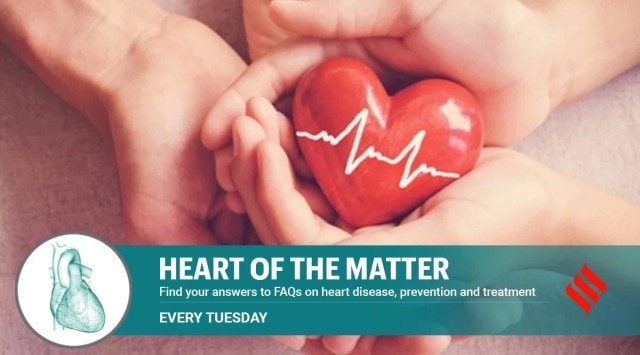- India
- International
Resting heart rate: Does the risk of heart attack increase if I record more than 100 beats per minute?
A slower resting heart rate can be normal for some people, like athletes, where it is an indication of fitness, which in turn is associated with a lower risk of a cardiac event. But I would say a resting heart range between 50 and 60 is ideal, says Dr Ranjan Shetty, HOD & Consultant, Interventional Cardiology, Manipal Hospital, Bengaluru
 If you want to measure your resting heart rate, then do it after at least two to three hours of exercise (Source: Getty Images/Thinkstock)
If you want to measure your resting heart rate, then do it after at least two to three hours of exercise (Source: Getty Images/Thinkstock) Dr Ranjan Shetty
When it comes to a conversation on our heart health, most of it is centred around cholesterol, the clotting of the blood and blood pressure. But there is another equally important marker called the resting heart rate that decides how likely we are to develop heart disease later in life. The best part is that since the heart rate is an indicator of our overall well-being, it can be corrected often by lifestyle modification and exercises.
So, what’s the resting heart rate to begin with? It is the number of times your heart beats per minute in a state of rest, that is when it is not into any activity. If you want to measure your resting heart rate, then do it after at least two to three hours of exercise, at least 10 to 15 minutes after stopping whatever you were engaged in, and after at least a one-two hour window of having tea, coffee or smoking a cigarette. The best way to measure it would be early in the morning after your sleep cycle and then checking the rates at other times of the day to get a fair idea. All you need to do is press your fingers at the base of your thumb or any pulse point and count the beats in a minute. A normal resting heart rate should be between 60 to 100 beats per minute. Anything over 100 beats per minute when you are at rest is considered fast and worrisome.
The rate can vary from day to day or moment to moment and can be influenced by many external factors like stress, anxiety, hormone patterns and even medication like anti-depressants and BP control drugs.
WHAT SHOULD BE YOUR IDEAL RANGE?
Now a fine distinction needs to be made here. As a society, we have seen that those with a resting heart rate of less than 65 have reported lesser cardiac events. As a society, we have also found that those with a resting heart rate of over 80 have tended to develop them more. But each individual has his own functional heart rate. Some people have a heart rate below 60 beats per minute at rest. Now this is not a cause for worry provided the person has the ability to raise the heart rate when needed during a physical activity, such as during a treadmill test (TMT). That pickup from a lower heart rate is more important. In fact, if a person can go up from 45 to 120 without feeling fatigued, then it indicates that he/she is in a fit state.

A slower resting heart rate can be normal for some people, mostly athletes, where it is an indication of a higher degree of physical fitness, which in turn is associated with a lower risk of a cardiac event. Some of them have a resting heart rate of 30. But I would say a resting heart range between 50 and 60 is the desired healthy limit. It is fairly common for someone who exercises a lot to have a resting heart rate of 60 beats per minute or less. A slower heart rate can also happen to those who are taking medication like beta blockers. Also, it is not abnormal to have a lower heart rate at night.
WHEN SHOULD YOU WORRY ABOUT LOW RESTING HEART RATES?
While a low resting heart rate in fit individuals may not seem worrisome, at other times, especially when accompanied by extreme fatigue and dizziness, it is indicative of some underlying heart condition. This may be because of ageing or the heart not transmitting electrical signals correctly. When this condition persists, it is time to consult your doctor.
WHAT ABOUT HIGH RESTING HEART RATES?
A high resting heart rate means you should get into a regime to bring it down instead of panicking in general. This means your heart has to work extra even during rest, which can impact its overall functionality in the long run. Existing research points to a resting heart rate near the upper end of the 60 to 100 spectrum as increasing your risk of cardiovascular disease. A 2013 study in the journal ‘Heart,’ which tracked cardiovascular health of about 3,000 men for 16 years, found that a high resting heart rate was linked to lower physical fitness, higher blood pressure, higher body weight and higher levels of circulating blood fats. The researchers also found that a resting heart rate between 81 and 90 doubled the chance of death, while a figure higher than this range tripled it.
CAN YOU BRING YOUR HIGH RESTING HEART RATES DOWN?
However, do not get caught in a web of numbers as there are ways to bring them down. For example, if you have a resting heart rate between 80 and 100, it almost certainly means that you are leading a sedentary life. This group needs High Intensity Interval Training (HIIT) exercise regimes. This means any workout that sweats you out fast as you do it at a very intense level and then slow down for the body recovery period. This is followed by another round of high intensity exercises. So let’s say you walk or do normal aerobic exercises. You do such exercises or walking for two minutes, then jog for a minute, then simmer down and repeat the cycle. This varying routine, done four days a week, usually gets your heart rate down over mostly 20 to 25 days. I have seen patients with a resting heart rate of 100 dropping to 50 and 60 within three months of exercising. HIIT improves your metabolism and will burn calories for about two hours after you exercise.
HOW DOES THE BODY DECIDE THE HEART RATE?
Your heart rate is controlled by the two branches of the autonomic nervous system, which has two branches, the sympathetic and the parasympathetic. The sympathetic nervous system releases hormones to accelerate the heart rate. The parasympathetic nervous system releases a hormone to decelerate it. Stress, caffeine and some form of excitement may raise heart rate, while meditating, yoga or taking slow, deep breaths may slow down your heart rate. At the beginning of your exercise, your body removes the parasympathetic response, which enables the heart rate to gradually increase. As you exercise more strenuously, the sympathetic system boosts your heart rate even more. Regular participation in cardiovascular exercises over an extended period of time can decrease your resting heart rate by increasing the heart’s contractile strength and the length of time the heart fills with blood. The reduced heart rate results from an increase in activity of the parasympathetic nervous system and a decrease in activity of the sympathetic nervous system.
WHEN DOES MY HEART RATE SPEED UP?
Of course, during exercising but then that’s normal. Your heart rate can increase to 130 to 150 beats per minute or more when you exercise because the heart is working to pump oxygen-rich blood in your system. But heart rate can go up because of fever, disease, dehydration, anxiety, medication as well as other health conditions. Staying hydrated is one of the best ways to take control over your heart rate as blood volume goes up and the heart doesn’t have to pump more blood then. During infections, your heart pumps harder to deliver oxygen to immune cells so that you can fight off the infection. Post-Covid, I have seen the resting heart rate in my patients go up to 100 within two to four months of disease occurrence. We give them a tablet and recommend an exercise and the phase passes by in about six to eight weeks. Even in Omicron, the resting heart rate in my patients has gone up after four to six months.
In the end, do not obsess over numbers. Some patients panic when they see they have reached 100 per cent of their predicted heart rate on a device. As I said, numbers are very individualistic and it all depends on your physical activity patterns and existing body conditions. Know that there are ways to regain control over your resting heart rate.
Must Read
Apr 27: Latest News
- 01
- 02
- 03
- 04
- 05








































